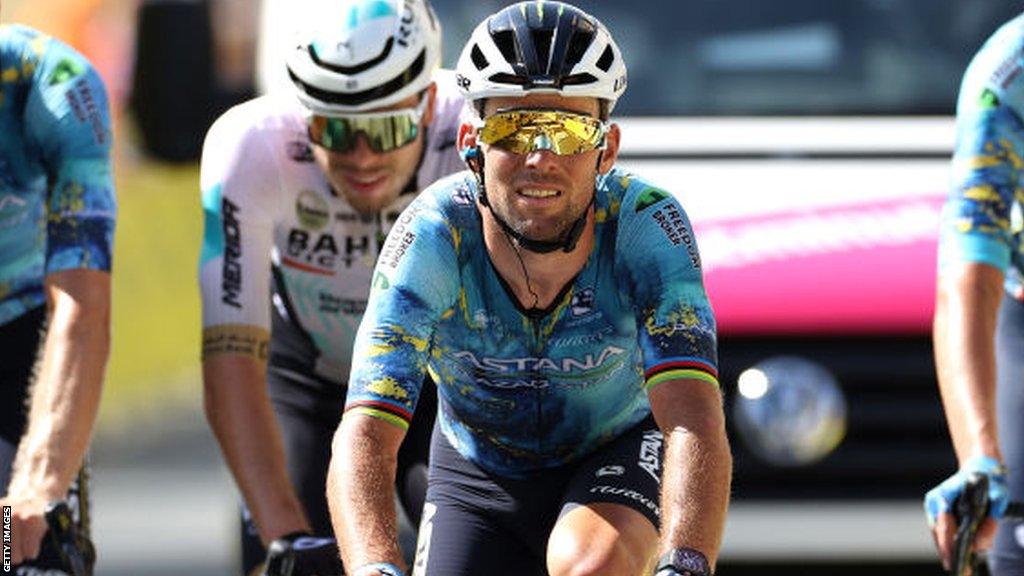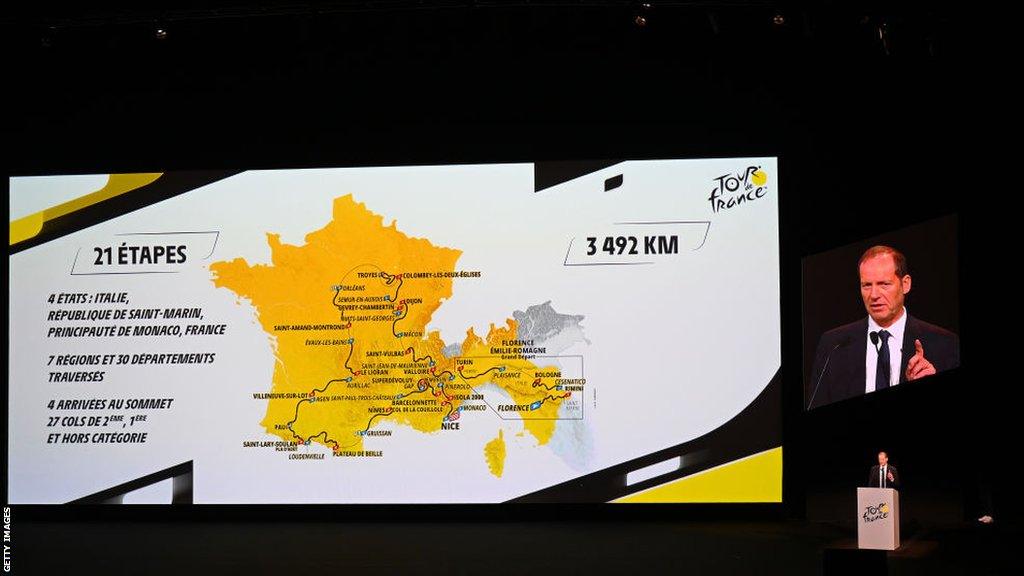Tour de France 2024: Mark Cavendish says route might be most difficult he has seen
- Published
- comments

Mark Cavendish has won a joint record 34 stages in Tour de France history
Mark Cavendish says he is "shocked" by how hard the route for the 2024 Tour de France is.
Wednesday's announcement revealed the race, from 29 June to 21 July, will feature two visits to the Alps, with Paris avoided because of the Olympics.
Cavendish, 38, has delayed plans to retire in order to try to break the record for Tour stage wins he currently shares with Eddy Merckx on 34.
"It's perhaps the most difficult course I've ever seen for a Tour," he said.
Astana-Qazaqstan rider Cavendish will have as many as eight sprint stages on which to try to break the record he shares with Belgium legend Merckx.
The Briton was forced out of this year's Tour on stage eight by a crash in which he sustained a broken collarbone.
"Honestly, I'm shocked at how hard this Tour de France is," Cavendish added.
The peloton will enter the Alps as early as the fourth stage and will return for the last few stages, before a hilly individual time trial between Monaco and Nice on the final stage.
The race will also visit the Pyrenees, with stage 14 crossing the Col du Tourmalet and the Hourquette d'Ancizan, and stage 15 tackling just shy of 5,000m of climbing across the Col de Peyresourde, Portet d'Aspet and Col d'Agnes on Bastille Day.
Defending champion Jonas Vingegaard said: "I'm really excited about it. It looks super hard, at least the third week looks super hard.
"The climbs, certainly the high-altitude ones, look harder."
It will be the first time since 1989 that the overall leadership of the race will be contested on the final stage.
Since Greg Lemond won a time trial on the Champs-Elysees to pip France's Laurent Fignon by eight seconds in the overall rankings, the final stage has always been a ceremonial procession to Paris with only the final sprint being contested.
The Tour organisers announced last year the race will finish outside of the Paris region for the first time in its 121-year history because of the Olympics starting five days later in Paris.
The race will start in Italy for the first time in its history, beginning in Florence in a year marking the centenary of Ottavio Bottecchia's Tour win, which was the first by an Italian, in 1924.
"The Tour has never climbed so high, so early," said Tour de France director Christian Prudhomme. "The panoramas in the high Alps are just splendid."

Tour de France director Christian Prudhomme unveiled the stage map on Wednesday
Iconic finish for Tour de Femmes
The Tour de France Femmes will climax with a breath-taking stage finishing at L'Alpe d'Huez, with the eight-stage race taking place from 12-18 August.
The 946.3km third edition of the race will start in the Dutch city of Rotterdam and also pass through Belgium before concluding in the French Alps.
Tour director Marion Rousse said: "We went to the Tourmalet last year, we wanted to go to iconic places and L'Alpe d'Huez is part of cycling's history.
"It's the toughest stage in Tour de France Femmes history with 4,000m of altitude gain.
"The stage also features the Col du Glandon, which I think is the hardest in France. Women have proved they have the level for that."
Demi Vollering, who won the 2023 Tour de Femmes, added: "I have never been to L'Alpe d'Huez but I saw it on television when I was a child.
"I said to myself 'OK, I want to ride there'. Being able to do it is super exciting."